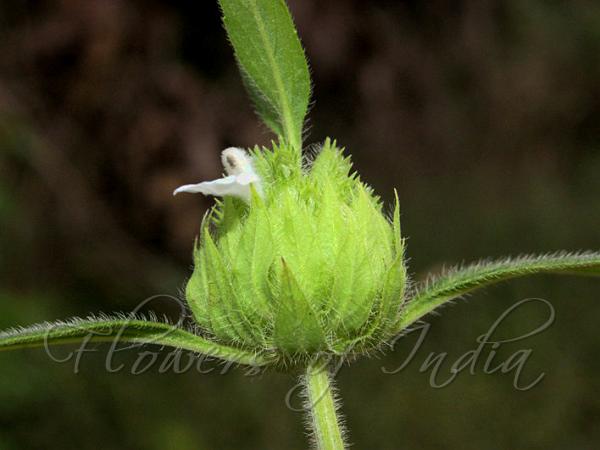|
| Head Leucas |
|

|

| File size | 76569 |
| Original date | 10/6/13 5:28 PM |
| Resolution | 708 x 531 |
| Flash | Flash fired |
| Focal length | 55.0mm |
| Exposure time | 1/100s |
| Aperture | 16.0 |
| Focus Distance | |
| Metering Mode | Multi-segment |
| Camera make | Canon |
| Camera model | Canon EOS 550D |
| Sensor type |
|
|
|
|
Photo: |
Botanical name: Leucas cephalotes Family: Lamiaceae (Mint family)
Synonyms: Leucas capitata,
Synonyms: Leucas capitata,
Head Leucas is an annual herb with stems erect,
unbranched or with few branches, 10-50 cm, leafy, hairy with spreading
and adpressed retrorse hairs. Leaves are narrow oblong-elliptic,
cuneate, nearly entire to slightly toothed, up to 8 x 2 cm, with long
and short eglandular hairs denser below. Leaf-stalk on lower leaves is
nearly-absent to about 5 mm. Flowers are borne in 1-2 distant spherical
dense whorls on branches, 2-3.5 cm in diameter, up to 50-flowered.
Bracts are numerous, imbricate, narrow, ovate-lanceolate, acuminate,
equalling calyces, ciliate on margins. Sepal cup is 1.2-1.5 cm,
tubular, slightly curved, clearly nerved, with a slightly oblique
mouth, distinctly hairy at throat, with eglandular and sometimes also
with very short glandular hairs; teeth 10, subequal, shortly
triangular, mucronulate, about 1 mm. Flowers are white, about 1.5 cm,
upper lip bearded; lower lip clearly longer than upper. Nutlets are
narrow oblong, bluntly trigonous, about 3 x 2 mm. Head Leucas is found
in cultivated fields as a weed, especially after a period of rain. It
is collected for use as a leafy vegetable in rural areas. It is found
in Afghanistan, Punjab, Himalayas, from Uttarakhand to Bhutan, at
altitudes of 150-2400 m. Flowering: July-October.
Medicinal uses:  It is cultivated for its medicinal uses and is readily available in
markets. One of the plant's most common historical uses has been as a
treatment for snakebite. It is also steeped in water which is then used
for bathing and for washing livestock.
It is cultivated for its medicinal uses and is readily available in
markets. One of the plant's most common historical uses has been as a
treatment for snakebite. It is also steeped in water which is then used
for bathing and for washing livestock.
 It is cultivated for its medicinal uses and is readily available in
markets. One of the plant's most common historical uses has been as a
treatment for snakebite. It is also steeped in water which is then used
for bathing and for washing livestock.
It is cultivated for its medicinal uses and is readily available in
markets. One of the plant's most common historical uses has been as a
treatment for snakebite. It is also steeped in water which is then used
for bathing and for washing livestock. | Identification credit: Gurcharan Singh | Photographed at Jim corbett park, Uttarakhand. |
• Is this flower misidentified? If yes,